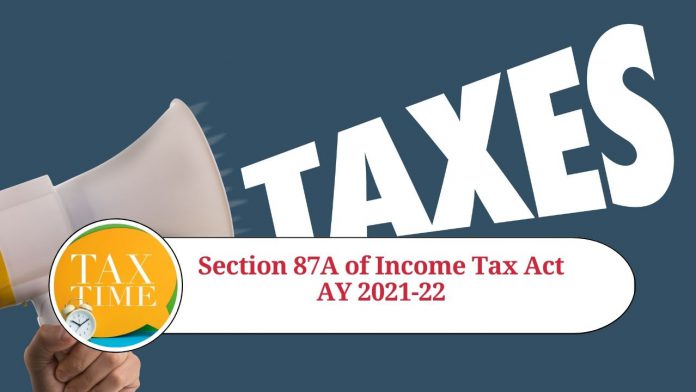Section 87A of the Income Tax Act, of 1961 provides a tax rebate to eligible individuals whose total income is below a certain threshold. This section was introduced in the Finance Act, of 2013, and has since undergone several changes. In this article, we will discuss Section 87A of the Income Tax Act, its eligibility criteria, and the tax rebate amount available for the assessment year 2021-22.
Eligibility Criteria for Claiming Tax Rebate under Section 87A
To be eligible for the tax rebate under Section 87A, an individual must fulfill the following conditions:
The taxpayer must be a resident individual.
The taxpayer’s total income for the financial year 2020-21 (the assessment year 2021-22) should not exceed Rs. 5,00,000.
The maximum rebate amount available is Rs. 12,500. This means that if the total tax payable by an individual is less than Rs. 12,500, then the tax liability will be reduced to zero, and no tax will be payable.
Calculation of Tax Rebate under Section 87A
The amount of tax rebate available under Section 87A is calculated as follows:
Determine the total income of the taxpayer for the financial year 2020-21 (the assessment year 2021-22).
Calculate the tax payable on the total income using the tax rates applicable for the assessment year.
If the tax payable is less than Rs. 12,500, then the tax rebate will be equal to the tax payable.
If the tax payable is more than Rs. 12,500, then the tax rebate will be limited to Rs. 12,500.
Illustration
Suppose an individual’s total income for the financial year 2020-21 (the assessment year 2021-22) is Rs. 4,00,000. The tax payable will be calculated as follows:
Tax payable = 5% of (Rs. 4,00,000 – Rs. 2,50,000) = Rs. 7,500
Since the tax payable is less than Rs. 12,500, the tax rebate available to the individual will be Rs. 7,500.
Limitations of Section 87A
The tax rebate is available only to individuals and not to Hindu Undivided Families (HUFs), firms, or companies.
The tax rebate is available only for the financial year 2020-21 (the assessment year 2021-22).
The tax rebate is not available if the total income of the individual exceeds Rs. 5,00,000 for the financial year 2020-21.
Final Conclusion
Section 87A of the Income Tax Act provides a tax rebate to eligible individuals whose total income is below Rs. 5,00,000 for the financial year 2020-21 (the assessment year 2021-22). The maximum rebate available is Rs. 12,500, which means that if the tax liability of an individual is less than Rs. 12,500, then the tax payable will be reduced to zero. Taxpayers should take advantage of this tax rebate and reduce their tax liability. However, it is important to note that the tax rebate is available only to individuals and not to HUFs, firms, or companies.
Read more useful content:
- section 145 of income tax act
- section 10e of income tax act
- section 9 of the income tax act
- section 94b of income tax act
- section 206aa of income tax act
Frequently Asked Questions (FAQs) about Section 87A of Income Tax Act AY 2021-22
Q. What is Section 87A of the Income Tax Act?
A. Section 87A of the Income Tax Act, 1961 provides a tax rebate to eligible individuals whose total income is below a certain threshold.
Q. Who is eligible for the tax rebate under Section 87A?
A. Resident individuals whose total income for the financial year 2020-21 (the assessment year 2021-22) is less than Rs. 5,00,000 are eligible for the tax rebate under Section 87A.
Q. What is the maximum amount of tax rebate available under Section 87A?
A. The maximum amount of tax rebate available under Section 87A is Rs. 12,500.
Q. How is the tax rebate calculated under Section 87A?
A. The tax rebate under Section 87A is calculated as the lower of the tax payable or Rs. 12,500. If the tax payable is less than Rs. 12,500, then the tax rebate will be equal to the tax payable.
Q. Can HUFs, firms, or companies claim the tax rebate under Section 87A?
A. No, the tax rebate under Section 87A is available only to resident individuals and not to HUFs, firms, or companies.
Q. Is the tax rebate available for all assessment years?
A. No, the tax rebate under Section 87A is available only for the financial year 2020-21 (the assessment year 2021-22).
Q. How can I claim the tax rebate under Section 87A?
A. The tax rebate under Section 87A can be claimed by filing the income tax return for the assessment year 2021-22. The rebate amount will be automatically calculated and credited to the taxpayer’s bank account after the return is processed by the Income Tax Department.
Q. Can the tax rebate under Section 87A be claimed by senior citizens or super senior citizens?
A. Yes, senior citizens and super senior citizens are eligible for the tax rebate under Section 87A if their total income is below Rs. 5,00,000 for the financial year 2020-21.




















